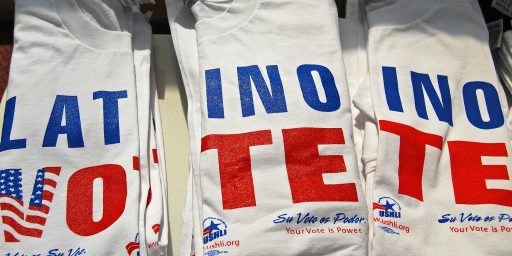Day Without Immigrants Roundup
An estimated one million illegal immigrants, supporters, and professional protestors showed up at rallies across the country yesterday protesting the fact that people who are in the country in violation of our laws are being subjected to unfair conditions, such as having to hide from immigration officials.* They took the day off work to demonstrate how vital they are to the American economy. The results were mixed.
AP:
More than 1 million mostly Hispanic immigrants and their supporters skipped work and took to the streets Monday, flexing their economic muscle in a nationwide boycott that succeeded in slowing or shutting many farms, factories, markets and restaurants. From Los Angeles to Chicago, Houston to Miami, the “Day Without Immigrants” attracted widespread participation despite divisions among activists over whether a boycott would send the right message to Washington lawmakers considering sweeping immigration reform.
[…]
Two major rallies in Los Angeles attracted an estimated 400,000, according to the mayor’s office. Police in Chicago estimated 400,000 people marched through the downtown business district. Tens of thousands more marched in New York, along with about 15,000 in Houston, 50,000 in San Jose and 30,000 more across Florida. Smaller rallies in cities from Pennsylvania and Connecticut to Arizona and South Dakota attracted hundreds not thousands. In all, police departments in more than two dozen U.S. cities contacted by The Associated Press gave crowd estimates that totaled about 1.1 million marchers.
The mood was jubilant. Marchers standing shoulder-to-shoulder filmed themselves on home video and families sang and chanted and danced in the streets wearing American flags as capes and bandanas. In most cities, those who rallied wore white to signify peace and solidarity.
NYT:
The impact of the call for a boycott was difficult to measure this afternoon. Some businesses in New York and Los Angeles that are run by immigrants or that cater largely to immigrants were closed, but many others remained open. Casino industry representatives in Las Vegas said few workers stayed out, and most of them had asked for the time off earlier. Chamber of Commerce officials in Washington and its Maryland and Virginia suburbs said they knew of no disruptions. But while it was still too early to gauge the economic effect, it was clear that the marches were attracting huge numbers of workers and students. The police in Chicago said the crowd at the rally had exceeded 400,000 by late afternoon.
LAT:
The normally bustling downtown Los Angeles produce and garment districts were virtually shut down today, and truck traffic at the ports was down sharply after many employees protesting the nation’s immigration policy’s did not show up for work. The dearth of activity in the produce and garment districts, both heavily dependent on immigrant labor, was so far the most dramatic sign of the impact of today’s organized immigration protests on local commerce. Only sporadic business closures and staffing shortages reported across the remainder of Southern California.
CNN:
It is unclear what impact the walkouts and demonstrations will have on the U.S. economy. The turnout was lower than predicted. Participants were likely to buy extra food and supplies before or after Monday. And absent employees will return to their jobs with extra work awaiting them.
WaPo:
The action may have been stronger had the coalition of grass-roots organizations that advises immigrants not been deeply conflicted over whether to endorse a boycott. Some supported the effort to demonstrate immigrant power, but others discouraged it, saying it was premature because Congress has not taken action since the first demonstrations, and because the strike might induce a backlash by those born in the United States.
[…]More than half of the 1,147 construction workers on projects at Dulles International Airport did not show up, said airports spokeswoman Tara Hamilton. Work on an underground tunnel linking airport terminals continued, but at a slower pace, she said.
Several businesses in the District, such as the Corner Bakery on Vermont Avenue downtown and La Chaumiere in Georgetown, shut their doors because their workers chose to boycott. “Unfortunately, most of our kitchen staff is Spanish and they decided to be part of the movement,” said La Chaumiere night manager Marielle Minges.
While the economic impact was limited and sporadic, the political impact is even less clear. The civil rights marches of the 1960s galvanized public opinion because of the obvious justness of the cause. Dignified Americans wearing their Sunday best, led by clergy preaching words familiar to most Americans, shamed the country for mistreatment. By contrast, the mixed messages and lack of discipline of the immigration rallies may well harm their cause.
This message is the essence of the argument that could carry the day:
“We are the backbone of what America is, legal or illegal, it doesn’t matter,” said Melanie Lugo, who with her husband and their third-grade daughter joined a rally of some 75,000 in Denver. “We butter each other’s bread. They need us as much as we need them.” (AP)
This one, not so much:
Many carried signs in Spanish that translated to “We are America” and “Today we march, tomorrow we vote.” Others waved Mexican flags or wore hats and scarves from their native countries. Some chanted “USA” while others shouted slogans, such as “Si se puede!” Spanish for “Yes, it can be done!” Others were more irreverent, wearing T-shirts that read “I’m illegal. So what?” (AP)
Unfortunately, too, protests have lost much of their persuasive appeal because of their ubiquity and the participation of a cadre of people who show up to protest everything:
The combination of the two is also less effective than the first alone:
As protesters marched through the Windy City’s business district, some waved Mexican and American flags and carried signs that read, “We’re not terrorists” and “We build your homes.” (CNN)
Even some immigrants and Americans of Latino descent were less than pleased with the protests:
Retired Col. Albert F. Rodriguez, a war veteran, said he understands the contribution immigrants have made to the United States, “but the difference is that we and millions of others like us did it legally. We’re all here today to tell all those illegal protesters, ‘You do not speak for me.’ ”
[…]
Despite the turnout across the nation, some who typically support immigrants questioned the effectiveness of a day without them. One of those was New Mexico Gov. Bill Richardson, a Latino, who said he was concerned about sending the message that immigrants “come to America to work, yet they’re not working.” “I’d rather see the individuals, all these demonstrations, going to congressional offices, pushing the Congress to act on immigration reform,” Richardson said. (CNN)
The other problem is that protests generally have less impact than they once did because of their ubiquity and the existence of a class of professional protestors who show up for anything:
In some cases, the rallies took on a broader tone of social action, as gay rights advocates, opponents of the war in Iraq and others without a direct stake in the immigration debate took to the streets. (NYT)
It doesn’t take too many fringe elements, who tend to draw more attention to themselves, to change the visual impact of a rally.
Lou Dobbs contends that this is not simply some “me too” types joining in but an indication of the changing character of the movement.
The Washington Post, alone among national papers, reported that ANSWER (Act Now to Stop War and End Racism) has become an active promoter of the national boycott.
Some illegal immigration and open borders activists in the Hispanic community are deeply concerned about the involvement of the left-wing radical group. But others, like Juan Jose Gutierrez, whom I’ve interviewed a number of times over the past several months, manages to be both director of Latino Movement USA and a representative of ANSWER. As Gutierrez told us on my show, “The time has come…where we need to stand up and make a statement. We need to do what the American people did when they pulled away from the British crown. And I am sure that back in those days many people were concerned that was radical action.”
Just how significant is the impact of leftists within the illegal immigration movement? It is no accident that they chose May 1 as their day of demonstration and boycott. It is the worldwide day of commemorative demonstrations by various socialist, communist, and even anarchic organizations.
[…]
Radicalism is not confined to Gutierrez and Latino Movement USA. Ernesto Nevarez of the L.A. Port Collective is promising to shut down the Port of Los Angeles today: “[Transportation and commerce] will come to a grinding halt. …They are going to put a wall along the border with Mexico. We’re going to put a wall between us and the ocean. And those containers ain’t going to move.”
No matter which flag demonstrators and protesters carry today, their leadership is showing its true colors to all who will see.
The “May Day” choice struck me as symbolically strange as well. Others, too. Still, my inclination is that the radicals comprise a pretty small element of the larger movement.
Further, I disagree with Dobbs that a one day demonstration of our dependency on illegal workers constitutes “radicalism.” It is quite reasonable for people whose existence here is criminal and potentially about to be subjected to harsher penalties to demonstrate that the issue is somewhat more complicated than many think. Of course, it could backfire, too. Dobbs:
“The meat packers are confirming what we know,” says University of Maryland economics professor Peter Morici, “and that is that this large group of illegal aliens in the United States is lowering the wage rate of semiskilled workers, people who are high school dropouts or high school graduates with minimal training.” In fact, a meat-packing job paid $19 an hour in 1980, but today that same job pays closer to $9 an hour, according to the Labor Department. That’s entirely consistent with what we’ve been reporting — that illegal aliens depress wages for U.S. workers by as much as $200 billion a year in addition to placing a tremendous burden on hospitals, schools and other social services.
Now, presumably, that has to do with the globalization of the economy and the decline of union power as much as illegal immigration. But it is confirmation of what many people believe. They may also do the kind of math Ed Morrissey is doing in terms of social services.
*A woman on NPR this morning actually cited that complaint.






The fact that they’re calling it “A Day Without Immigrants” is dishonest. It’s a straw man.
The vast majority of people opposed to illegal immigration have no problem whatsoever with legal immigration.
By making it appear that they’re protesting for immigrants in general when it is clear that the issues they address like low pay, unfair conditions etc. only apply to illegal immigrants, they are recasting this as an ethnic, a nationalistic, a racial issue.
If legal immigrants are being subjected to discrimination and having their rights violated, hell, I’ll march with them. But as long as their position is “criminals should be treated like law-abiding citizens” they’ll get nothing but incredulity from me and millions of other Americans.
I saw ’roundup’ in the headline and I thought you were going to mention it in the story, as like immigration officials had a roundup of illegal trespassers.
The marchers chanting “Today we march – Tomorrow we vote.” infuriated the daylights out of me…
Immigration is not the real issue. It is how Americans use people who are ‘illegal’ and therefor have not equal rights to a citizen. So, they are paid less, ALLOWED to work by the mob who sets up the deals and politicians, especially in California. It is not fair to ALLOW them to work and be used without EQUAL RIGHTS to Americans. This should be obvious to any American that ALLOWING them to work here illegally makes every American RESPONSIBLE for those who we allow to work illegally. There is no way to justify using peoole like America does.
Sorry Novel, that argument don’t float. It’s like accusing me of benefitting from slavery, not taking into account that my ancestors arrived here LONG after slavery was abolished.
Guilt by association, it’s even less than so yesterday…
It does raise a good question, though: are there good reasons why illegal immigration should be treated differently than other crimes? I’d certainly like to hear the argument.
It can’t be that we’re �a nation of immigrants�. All countries are from Albania to Zimbabwe. Except maybe Tanzania, everybody everywhere is ultimately from somewhere else.
It can’t be that the perpetrators just want a better way of life. All criminals do. All humans do. It’s not a justification for breaking the law.
It can’t be that many of those who enter illegally subsequently live within the law. That’s true of other lawbreakers as well. We prosecute them nonetheless. It is sometimes used to mitigate the penalty, though, and I think that might be reasonable in this case, too. The problem here is that many illegal immigrants demonstrate indifference to any other law that gets in their way, too, e.g. drivers licenses and mandatory insurance.
It can’t be that there are so many of them. Otherwise we wouldn’t prosecute traffic violations. And the �how do we deport 12 million� argument? Puh-leeze. Does anyone propose that we give a pass to other lawbreakers because we can’t resolve all the other unsolved crimes at once?